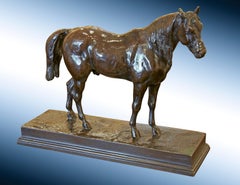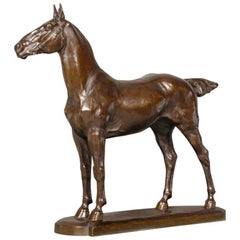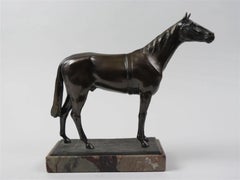Want more images or videos?
Request additional images or videos from the seller
1 of 12
Georges MalissardPurebred "Coyote"early 20th century
early 20th century
$21,412.55
£15,862.93
€18,000
CA$29,451.72
A$32,758.76
CHF 17,185.20
MX$399,731.34
NOK 215,695.98
SEK 203,267.30
DKK 137,049.63
About the Item
Purebred named "Coyote"
by Georges MALISSARD (1877-1942)
Horse bronze sculpture with a dark brown patina
old cast
Signed on the base " G. Malissard "
And titled " Coyote "
France
Early 20th century
height 41,2 cm
length 51 cm
Biography :
Georges Alexandre Paul Marie Malissard, known as Georges Malissard (1877-1942) was a renowned French sculptor known chiefly for his equestrian portraits. He was born into an established family of industrialists near Valenciennes. Malissard was encouraged by the animalier Emmanuel Frémiet and became then himself a sculptor.
In 1908, Malissard exhibited for the first time at the Salon des Artistes Francais, and received his first commission to sculpt two of Kaiser Wilhelm II’s thoroughbreds in Berlin. He then moved to Paris, and after briefly sharing a studio with the sculptor Charles Marie Vicomte du Passage, he settled in his atelier rue Pergolèse.
Specializing in equestrian scenes, Georges Malissard then enjoyed great success, both with the owners of horses whose portraits he made, and with the general public. After the Armistice, the French State ordered the statues of the victorious marshals : Foch, Pétain and Lyautey. Malissard also knew how to model subjects other than horses such as the lynx, the Asian elephant, deer, wild boar, etc. Malissard was highly connected in the horse-riding milieu. Despite being commissioned by the French government to sculpt prize-winning animals from the Salon de l’Agriculture, the artist’s main interest and focus were the portraits of famous racehorses racing at the Grand Prix de Paris, the Grand National, the President of the Republic Prize or the Arc de Triomphe Prize.
Malissard regularly exhibited his works at Salons. Notable examples include the Salon des Artistes Français- where he received an Honorable Mention in 1919, the Salon de la Société
Hippique at the Grand Palais and the Horse Show in London-where he was awarded the first prize in 1913. He also exhibited at the Universal Exhibition in Brussels (1910) and the Royal Academy, London’s 1930 Summer Exhibition. These platforms launched him on the international art scene so that from 1918 onwards he mostly worked to commission.
Additionally, Georges Malissard was a coveted sculptor by some of the most important figures of the era. Monarchs such as George V, Alfonso XIII, the Belgian royal family and the Queen of Romania posed for him. Industrialists like the perfumer Guerlain, the chocolatier Menier as well as socialites such as the Duchesse d’Uzès, the Duchesse de Castries and Béatrice de Camondo sat for him. However, what brought him to fame, were the equestrian portraits of key Allied military leaders he was commissioned to do after World War I. He sculpted Marshals Foch, Haig, Pershing, Pétain, Lyautey, Franchet d’Esperey, Gallineni, Fayolle, Joffre on horseback as well as the Generals Weygand and Gouraud. The peak of his career came in the late 1920s, when he was invited, on two occasions, to design the Foch Memorials in Cassel (1928) and London (1930). After this, he was referred to as a ‘statuaire’, the most honorific title for a sculptor in the Third Republic. Georges Malissard was named Knight of the National Order of the Legion of Honor in 1933.
- Creator:Georges Malissard (1877 - 1942, French)
- Creation Year:early 20th century
- Dimensions:Height: 16.23 in (41.2 cm)Width: 20.08 in (51 cm)Depth: 4.53 in (11.5 cm)
- Medium:
- Movement & Style:
- Period:
- Condition:
- Gallery Location:PARIS, FR
- Reference Number:Seller: N.78201stDibs: LU2514214003592
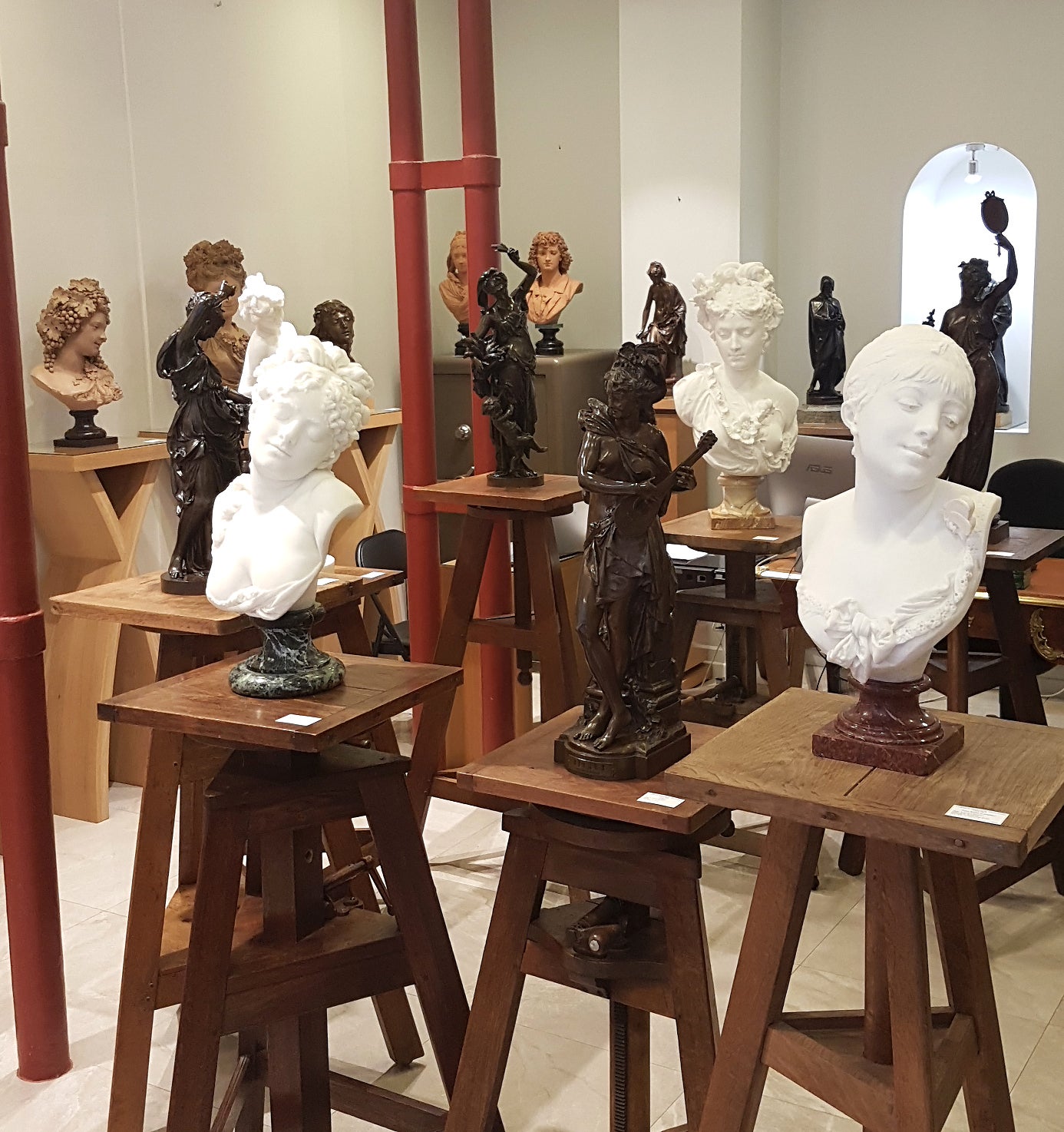
About the Seller
5.0
Recognized Seller
These prestigious sellers are industry leaders and represent the highest echelon for item quality and design.
Established in 1992
1stDibs seller since 2023
8 sales on 1stDibs
Typical response time: 1 to 2 days
- ShippingRetrieving quote...Shipping from: PARIS, France
- Return Policy
Authenticity Guarantee
In the unlikely event there’s an issue with an item’s authenticity, contact us within 1 year for a full refund. DetailsMoney-Back Guarantee
If your item is not as described, is damaged in transit, or does not arrive, contact us within 7 days for a full refund. Details24-Hour Cancellation
You have a 24-hour grace period in which to reconsider your purchase, with no questions asked.Vetted Professional Sellers
Our world-class sellers must adhere to strict standards for service and quality, maintaining the integrity of our listings.Price-Match Guarantee
If you find that a seller listed the same item for a lower price elsewhere, we’ll match it.Trusted Global Delivery
Our best-in-class carrier network provides specialized shipping options worldwide, including custom delivery.More From This Seller
View AllSymbole
Located in PARIS, FR
Horse "Symbole"
by René PARIS (1881-1970)
Animal sculpture in bronze with a nuanced light brown patina
signed on the base "René Paris"
and dated "1942"
Cast by "A. Valsuani" (with f...
Category
1940s French School Figurative Sculptures
Materials
Bronze
$10,706
Turkish Horse
By Antoine-Louis Barye
Located in PARIS, FR
Turkish Horse
by Antoine-Louis Barye (1796-1875)
"Cheval turc, antérieur gauche levé, terrasse carrée"
Bronze sculpture with a nuanced dark brown patina
Signed " Barye " on the base...
Category
Late 19th Century French School Figurative Sculptures
Materials
Bronze
Turkish Horse
By Antoine-Louis Barye
Located in PARIS, FR
Turkish Horse
by Antoine-Louis BARYE (1796-1875)
"Cheval turc, antérieur gauche levé, terrasse carrée"
Bronze with a nuanced dark green patina
signed "Barye" on the base
cast by "F....
Category
1880s French School Figurative Sculptures
Materials
Bronze
Half-blood Horse, head raised
By Antoine-Louis Barye
Located in PARIS, FR
Half-blood Horse, head raised
by Antoine-Louis BARYE (1796-1875)
A bronze sculpture with a dark brown patina
Signed on the base " Barye "
Cast by " F. Barbedienne fondeur " (with th...
Category
Late 19th Century French School Figurative Sculptures
Materials
Bronze
Horse training with its stable lad
Located in PARIS, FR
(after) Arthur Marie Gabriel comte du Passage (1838-1909)
Horse training with its stable lad
A rare large bronze group with nuanced dark brown patina
circa 1896
signed on the base "...
Category
Late 19th Century French School Figurative Sculptures
Materials
Bronze
Turkish Horse
By Antoine-Louis Barye
Located in PARIS, FR
"Turkish Horse"
by Antoine-Louis Barye (1796-1875)
Bronze with nuanced dark brown patina
cast by BARBEDIENNE
France
circa 1880
height 28 cm
length 31,5 cm
This is the biggest size...
Category
1880s French School Figurative Sculptures
Materials
Bronze
You May Also Like
Le cheval demi-sang arabe
By Antoine-Louis Barye
Located in Mc Lean, VA
A nineteenth-century cast of Antoine-Louis Barye's Le cheval demi-sang arabe (no. A125-Poletti; A148-Pivar), with nice patina.
Poletti and Richarme, Barye: ...
Category
Late 19th Century Realist Figurative Sculptures
Materials
Bronze
Horse
By Charles Favart
Located in Pasadena, CA
Charles Favard is a sculptor who mastered this rare technique of direct cutting: stone, marble, wood ... materials that he uses with particular ease. His innate sense of volume allow...
Category
Early 2000s Contemporary Figurative Sculptures
Materials
Bronze
$6,000 Sale Price
20% Off
Mare - hunting horse by Josuë Dupon 1864-1935
Located in Gent, VOV
A beautiful large bronze sculpture of a proud standing mare. Old sand cast created during the artist Josuë Dupon's lifetime.
Josuë Dupon (also Josué or Josue Dupon) was a Flemish sculptor and engraver. His work also includes painting and graphics.
He received his training through evening classes at the academy of Roeselare and Antwerp (1884) and later at the National Institute of Fine Arts (1887). In 1891, he won a gold medal with the monumental sculpture group Samson kills the lion and was runner-up in the Prix de Rome for sculpture. From that year on, his work appeared regularly in exhibitions at home and abroad. His reputation was such, that he became one of a select group of sculptors allowed by King Leopold II to carve statues in Ivory, which was imported from the Congo, the Belgian colony. In 1893 his exceptionally refined ivory statue of Diana was bought by the Antwerp Royal Museum of Fine Arts, which also acquired his spectacular bronze Vulture defending its prey a year later.
Working in every genre and mastering every technique and material, Josuë Dupon became best known as a sculptor of exotic animals. He was equally capable of faithfully expressing anatomical detail as of rendering the animals' nature. Josuë Dupon was a technically faultless realist, with a sense of the dramatic, a feeling for decorative complexity and a tendency towards idealizing. The placement of his camel driver and two bronze groups at the entrance to Antwerp Zoo confirmed this reputation as animalier.
The career that Dupon subsequently built, brought him numerous important awards and an appointment as professor at the Antwerp Academy, a tenure he held between 1905 and 1934. Besides animals, he sculpted busts, war memorials and public monuments. For one of the largest sculptural monuments and the largest fountain in the city of Buenos Aires, called Monument of the Two Congresses, he collaborated with his good friend, the Belgian sculptor Jules Lagae. Josuë Dupon created several statues of mighty condors for this monument.
At the start of his career his conception of art was strongly influenced by traditional 19th century artistic ideals. After the turn of the century his compositions and surface treatment changed and became more modern. He met Rembrandt Bugatti around 1905 or 1906 in the 'Jardin des Plantes' in Paris and invited him to Antwerp. Bugatti began travelling to Antwerp in 1906 to observe and sculpt the inhabitants of its zoo, which was then considered the best in the world, and Dupon allowed Bugatti to stay with him during several of his early visits. As such Dupon became a friend and a bit of a father figure to Rembrandt Bugatti.
Dupon did not play a very active part in artistic movements or associations. Dupon remains an important sculptor not only through his body of work but also because of the influence he exercised through interactions and collaboration with other sculptors such as Lagae, Bugatti and Bourdelle but also because he trained leading sculptors such as Albéric Collin (1886-1962), Willy Kreitz...
Category
19th Century Figurative Sculptures
Materials
Bronze
Horse
Located in Greenwich, CT
Figure of a horse , French 1940's , on a marble base
appears unsigned
finely carved, beautiful rendering, nice patina
Category
1940s Figurative Sculptures
Materials
Bronze
$1,380
[Morgan Le Fey]
By Hazel Brill Jackson
Located in Boston, MA
Signed on base: "Hazel Brill Jackson". Also with artist's monogram. In fine condition.
Hazel Brill Jackson (Born December 15, 1894, in Philadelphia) spent most of her early childhood in Italy. Attending the Scuola Rosatti in Florence, Jackson enjoyed afternoons at the zoo, pursuing her favorite pastime: drawing animals. World War I forced the return of the Jackson family to the United States where they settled in Boston. Hazel spent the next four years at the Boston Museum School, where she studied with Bela Pratt and Charles Grafly.
Jackson returned to Rome after the war, where she worked with Angelo Zanelli and later had her own studio. With such works as Roman Work Horse and Ned (Mussolini's favorite jumper), she began to exhibit both in Rome and Florence, and eventually became a member of the Circolo Artistico di Roma.
The sculptress returned to the United States in 1935 and opened a studio in Newburgh, New York. She continued to sculpt animals, concentrating on horse and dog portraits. Jackson had one-woman shows at the Guild of Boston Artists in 1938 and in 1968. In 1945, she was awarded the Ellin P. Speyer Prize by the National Academy of Design in New York City for Play-Day and Romance (a mare and foal group) and in 1949, she won the same prize for Indian Antelope. Hazel Jackson is represented in the Brookgreen Gardens collection by The Listeners, a sculpture group of raccoons, which was placed there in 1964. Don Quixote, now at Wellesley College won Jackson the Mahonri Young...
Category
Mid-20th Century American Realist Figurative Sculptures
Materials
Bronze
Horse XII by Pierre Yermia - Animal bronze sculpture, elegance, wild, force
By Pierre Yermia
Located in Paris, FR
Horse XII is a bronze sculpture by French contemporary artist Pierre Yermia, dimensions are 48 × 53 × 25 cm (18.9 × 20.9 × 9.8 in).
The sculpture is signed and numbered, it is part ...
Category
Early 2000s Contemporary Figurative Sculptures
Materials
Bronze
More Ways To Browse
Antique Sculptures London
Societe Des Bronzes De Paris
Royal Elephant
Gold Horse Statue
G Wilhelm
Horse Riding Sculpture
Boar Sculpture
Antique Bronze Deer
Antique Wild Boar
Elephant Statue
Bronze Equestrian Statue
Boar Bronze
Fremiet Bronze
Wild Boar Sculpture
Fremiet Emmanuel
Knight On Horseback
Kaiser Wilhelm
Bronze Boar Sculpture
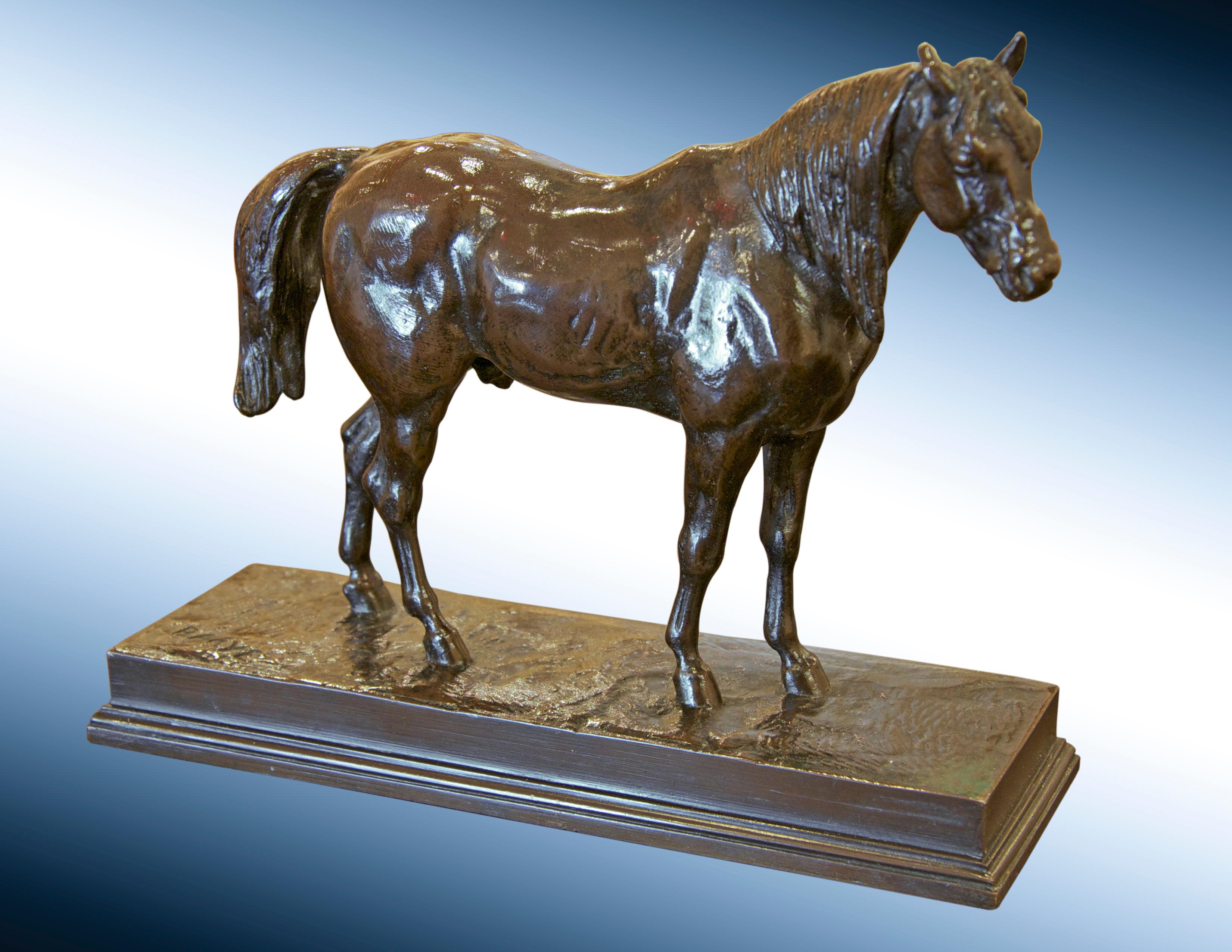
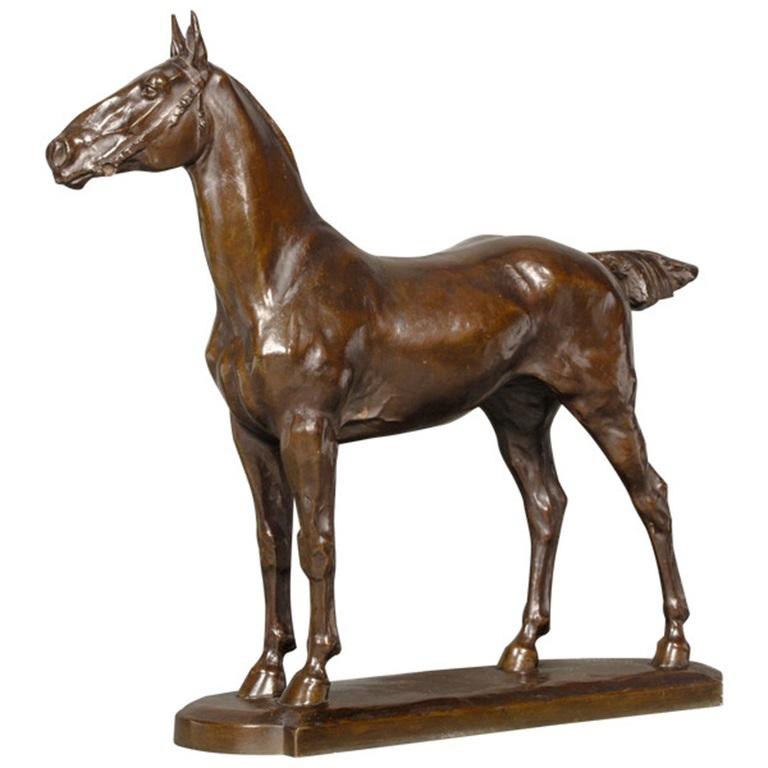
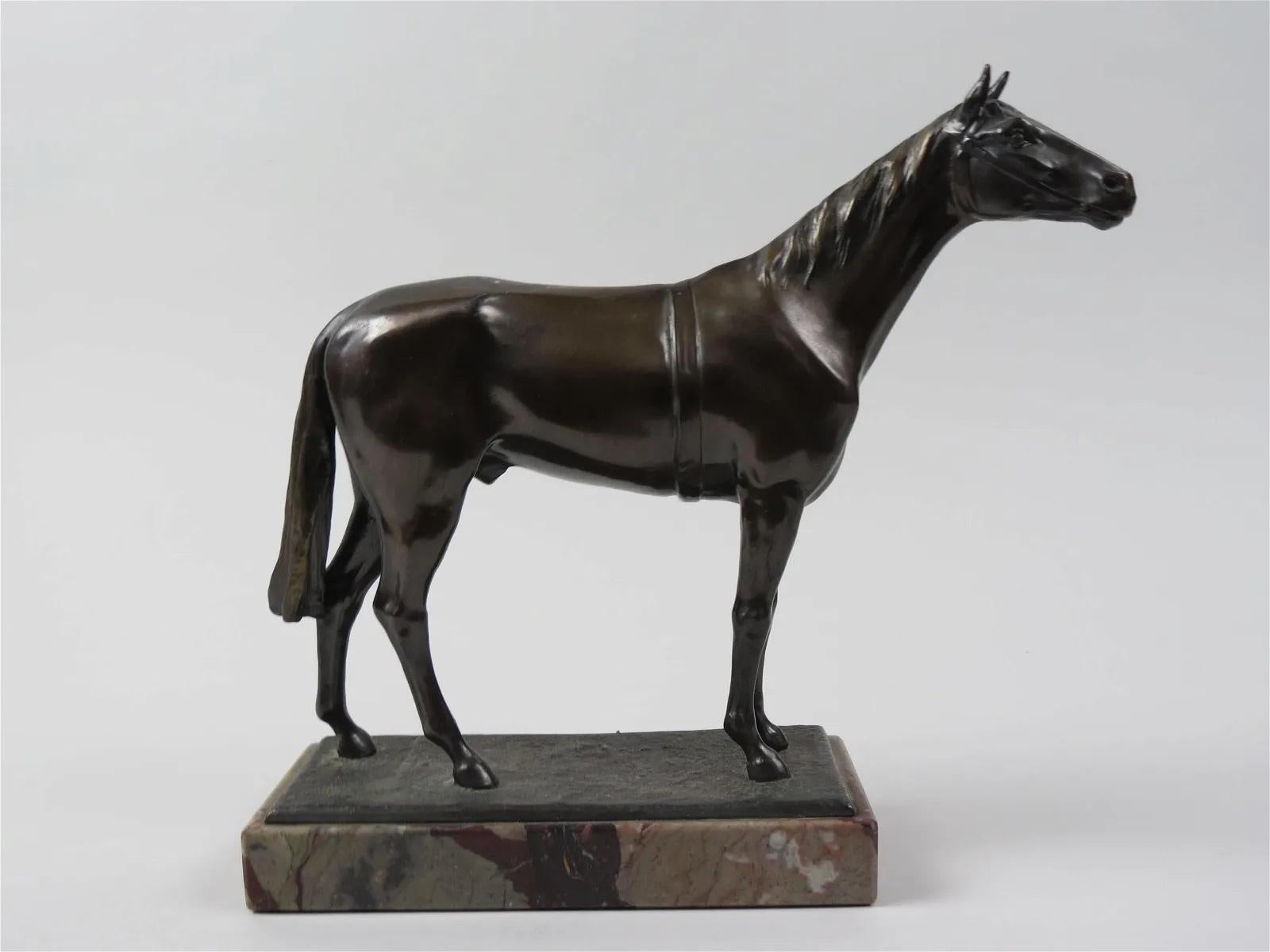
![[Morgan Le Fey]](https://a.1stdibscdn.com/hazel-brill-jackson-sculptures-morgan-le-fey-for-sale/a_3973/1702504737863/09_12_11_DS_master.jpg)
